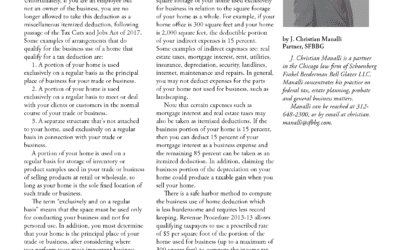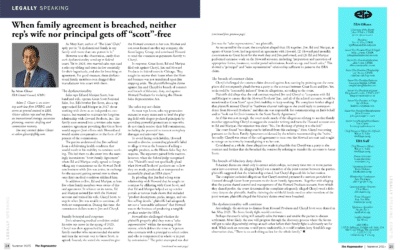Question: With the 2020 calendar year coming to a close, can you provide some suggestions for tax planning moves to make before year-end?
Answer: The time value of money principle has long taught that a dollar today is worth more than a dollar tomorrow. As such, conventional year-end tax planning has always involved accelerating deductions to the current year and deferring income to the following year to postpone the payment of income taxes. With the increased budget deficit and a new presidential administration seemingly less inclined to keep recent taxpayer-friendly legislation intact, a meaningful tax increase may be in the making for next year and beyond. That being said, the better strategy for 2020 may be to accelerate income to 2020 and defer deductions to 2021.
Many employers pay employee bonuses within a short period of time after year-end. Employees who anticipate receiving bonuses in the early party of 2021 may implore their companies to accelerate the payment of their bonuses to December of this year so the bonuses are taxed at what may be lower income tax rates. Business owners who historically delay year-end billing or cash receipts may do just the opposite this year and seek to accelerate 2020 revenue to increase the income that will be taxable at 2020 income tax rates.
With the capital gains tax rate possibly increasing next year, similar tax planning maneuvers may be appropriate for taxpayers facing large capital gains. Taxpayers selling real estate properties may benefit from closing sales in 2020 rather than risking an increase in or perhaps elimination of the favorable capital gains tax rate next year. The same holds true for business owners in the process of selling their businesses who may save income tax by closing sale transactions and paying tax on sale gains in 2020.
On the deduction side, deferring deductions to 2021 may yield a more positive tax result if income tax rates rise next year. Individual taxpayers who routinely pay their fourth quarter state tax estimate in December may want to postpone payment until after year-end. The same may hold true for taxpayers who are making charitable contributions as the deductions may be more meaningful next year. However, deferring the payment of these and other types of itemized deductions until 2021 may not be as beneficial as may seem to be the case if some of the more stringent limits on itemized deductions are reintroduced into the tax code.
In the 2017 Tax Act, Congress eliminated the opportunity for taxpayers selling personal property used for business or investment purposes to avoid paying tax on the gains by reinvesting the proceeds in personal property of like kind. Like-kind exchanges of real estate property may be curtailed or eliminated in the next round of tax legislation. Any real estate owner seeking to defer gain through a disposition of an existing property and an acquisition of a new real estate property may be best served by consummating the sale and purchase as soon as possible. Even if the transaction does not close in 2020, a taxpayer who enters into a binding contract to consummate an exchange this year may be grandfathered from the impact of future legislation that may curtail this tax benefit, in whole or in part.
Lower estate and gift tax exemptions may impact decedents dying and/or gifts made after 2020. The current Federal estate and gift tax exemption of $11,580,000 might be reduced to anywhere from $1,000,000 to $6,000,000. Taxpayers with the wherewithal should consider large year-end gifts as the IRS has previously indicated it will not impose taxes retroactively on taxpayers who make gratuitous transfers in years before a lower transfer tax exemption is enacted.
With prospective tax increases on the horizon, it is safe to say that 2020 year-end planning will require some out-of-the box thinking. The uncertainly regarding future tax laws compounds the difficulty of 2020 planning. Even in the absence of certainty, one can be reasonably assured that the Federal tax code will not be more taxpayer-friendly in 2021 than it is in 2020.
The Tax Corner addresses various tax, estate, asset protection, and other business matters. Should you have any questions regarding the subject matter or if you have questions you want answered, you may contact Bruce at (312) 648-2300 or e-mail [email protected].
A version of this article appears in Forbes. Click here to view.



